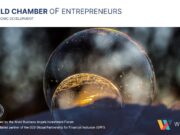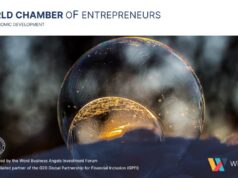Prof Rudy Aernoudt discusses a critical issue: Business angel funding is being stretched to cover both startup and second-round funding, so fewer startups are receiving the initial funding they need. Will this empty the pipeline for venture capitalists in the future?
Prof Rudy Aernoudt was a guest editor of the World Class Startup magazine’s special edition for the Global Fundraising Stage of the World Congress of Angel Investors, WBAF 2022. Angel Investor Review now shares his article with its subscribers online.
Prof Rudy Aernoudt is a Senior Economist at the European Commission, Professor of European economy at the University of Ghent & Nancy, Co-founder of EBAN, and European Continental Chair of the World Business Angel Investors Week.
 The business angel sector has matured. Business angels have long existed, but the modern iteration with its roots in theatre angels emerged during the 1970s via Band of Angels in the USs, including the legendary Silicon Valley/Palo Alto community and Venture Capital Report in the UK. It started on the European continent twenty years ago. Today Europe has over 400 business angel networks and approximately 300,000 business angels. Ever crisis resilient, in 2020 COVID year, business angels invested only five percent less than in 2019.
The business angel sector has matured. Business angels have long existed, but the modern iteration with its roots in theatre angels emerged during the 1970s via Band of Angels in the USs, including the legendary Silicon Valley/Palo Alto community and Venture Capital Report in the UK. It started on the European continent twenty years ago. Today Europe has over 400 business angel networks and approximately 300,000 business angels. Ever crisis resilient, in 2020 COVID year, business angels invested only five percent less than in 2019.
Venture capital versus business angels
Venture capitalists argue that business angel investment is small beer compared to the amounts they allocate. But this is to compare apples with oranges. Business angels typically finance the start of a company, unlike venture capitalists. This start-up phase bears more risk and usually requires smaller investment amounts Essentially business angels sow the seed while venture capitalists invest closer to the harvest. Business angels are responsible for start-up financing for 90% of start-ups in Europe. In the United States, they are involved in 18 times more start-ups than venture capitalists. In other words, without business angels there would be virtually no start-ups and the venture capitalists would have far fewer companies to consider for investment.
The impact of COVID-19
Since COVID, something has fundamentally changed in the behaviour of the business angels. They are increasingly the only sources of funding for start-ups and also for second round funding as the Crisis pushed venture capitalists towards lower risk, later stage fundings. As the NVCA Venture monitor 2022 concludes: “first-financing capital could become more difficult to raise should volatility persist”.
Reasons why venture capitalists are investing later can include the round being too small to be cost effective or the risks are still too great because the companies are taking longer to achieve market traction Business angels, foreseeing this this are reserving funds for second rounds, and forming syndicates to meet this gap.
Towards a new start-up gap
Preliminary research confirms thiss. In the US, during COVID, business angel follow-on deals increased by 26%, but investment in new start-ups fell by 12% (Angel Capital Association data, 2021). Analyses of the Scottish and Irish Business Angel (Colin Mason, 2022) also confirmed this shift; in Scotland, 90% of the funding by business angels went to follow-on investments. The impact of COVID crisis has therefore led to lower cash availability for start-ups leading to greater liquidity problems in this part of the market. This shortfall was temporarily absorbed by government-supported, bridging loans and equity co-investments with business angels, but much of this intervention has now ceased.
Another feature of the crisis is that business angels are tapping into their reserves to invest. However this pool of capital is not infinite. If this phenomenon continues and a new source of capital does not start investing in start-ups, the pipeline for venture capitalists will also empty and the start-up ecosystem, much needed not only in times of crisis but also post-Crisis , will be jeopardized.



























